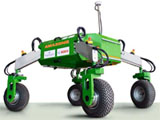Agricultural and Biological Systems Engineering, Department of

Department of Agricultural and Biological Systems Engineering: Faculty Publications
Soil water sensors for irrigation scheduling in the United States: A systematic review of literature
Document Type
Article
Date of this Version
1-9-2023
Citation
Agricultural Water Management 278 (2023) 108148. https://doi.org/10.1016/j.agwat.2023.108148
Abstract
Soil water sensors (SWS) have been widely researched and practiced for irrigation scheduling. Due to popularity of this approach, there is a need for frequent reviews of the SWS literature to keep the researchers, extension professionals, and end-users updated and to help with defining and modifying future directions. In addition, existing literature reviews do not systematically report and summarize the results of previous studies. To address this gap, a systematic review was carried out to identify and analyze related literature published in the United States in the past two decades. Two focus areas were SWS accuracy assessment and SWS application in irrigation scheduling. The results showed that SWS accuracy was most susceptible to sensor calibration. The reported root mean square errors had similar ranges and means among different technologies, installation orientations, and study environments. Compared to other scheduling methods, SWS-based scheduling resulted in water saving, with average amounts ranging from 1 % when compared to canopy temperature methods to 38 % in case of traditional approaches. In addition, SWS-based scheduling led to larger or similar yields compared to other scheduling methods. Texas and Nebraska were the top two states in terms of the number of studies on SWS accuracy and irrigation scheduling.
Included in
Bioresource and Agricultural Engineering Commons, Environmental Engineering Commons, Other Civil and Environmental Engineering Commons


Comments
Open access.